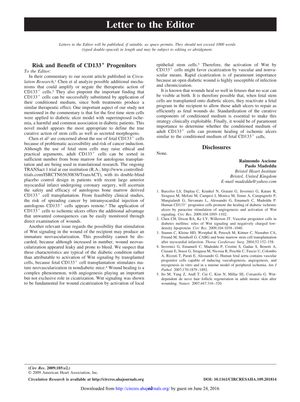Risk and Benefit of CD133+ Progenitors
July 2009
in “
Circulation Research
”

TLDR CD133+ progenitor cells have therapeutic potential for diabetic ulcers and heart attack recovery, with manageable risks.
In a letter to the editor, Ascione and Madeddu discuss the therapeutic potential and concerns associated with CD133+ progenitor cells, particularly in the context of their recent study on diabetic ulcers with superimposed ischemia. They highlight that their study was the first to apply stem cells to such a model, which is significant for diabetic patients. The letter addresses concerns about the use of fetal CD133+ cells, such as accessibility and cancer risk, but notes that adult CD133+ cells can be harvested for autologous transplantation. The ongoing TRANSact 1 trial aims to evaluate the safety and efficacy of these cells in myocardial infarction patients. They also discuss the risk of cancer from intramyocardial injection of autologous CD133+ cells as remote and mention that any unwanted consequences in ischemic ulcers can be monitored directly. The letter touches on the potential issue of immature neovascularization due to Wnt signaling stimulation but suggests that the observed characteristics might be more related to diabetes than the transplanted cells. They propose that CD133 cells could promote wound healing through vascular and nonvascular means, and that fetal stem cells might reactivate a fetal healing program in adult ulcers. The importance of standardizing the curative components of conditioned medium for clinical use is also emphasized, along with the need to investigate if the conditioned medium from adult CD133+ cells can similarly promote healing.




